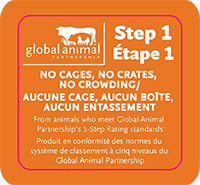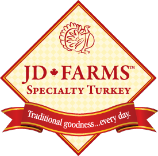
JD Farms Specialty Turkey Certification Standards

All JD Farms Turkeys are fed Non-Genetically Engineered grain with no anti-biotics
I. Terms of Reference. What is it to be certified?
- The intention of this document is to provide the public with the assurance that any product labeled as JD Farms Certified Specialty Turkey or JD Farms Specialty Turkey has been produced according to the provisions of this document and have met all applicable requirements as listed in this document.
- The items listed in this document are to provide the public with details of the scope of the program, the production requirements and claims made for the certification of product labeled as JD Farms Certified Specialty Turkey or JD Farms Specialty Turkey.
- The ultimate objective of this document is to assure the public that the production has been verified by a third party independent audit of each production unit and flock which is labeled as above and that any flock not meeting all of the criteria as listed in this document will not be labeled as JD Farms Certified Specialty Turkey or JD Farms Specialty Turkey.
- The producers of specialty turkeys intending to be sold and labeled as JD Farms Certified Specialty Turkey or JD Farms Specialty Turkey must comply with the applicable provisions of this standard. Production practices implemented in accordance with this standard must maintain production at levels to maintain or improve the well being of the animals being produced.
- Any non-compliance must be corrected within an agreed to time frame between client and JD Farms.
II. Recordkeeping – By Certified Operations
- A certified operation must maintain records concerning the production of all products intending to be marketed as JD Farms Certified Specialty Turkey or JD Farms Specialty Turkey .Such records must:
- Be adapted to the particular farm upon which the certified product is being produced.
- Fully disclose all production activities on a given farm in sufficient detail as to be readily understood and audited.
- Be sufficient to demonstrate compliance with the terms stated in this document.
- The certified operation must make such records available to an independent auditor appointed by JD Farms at an agreed upon time during normal business hours. Each flock produced and marketed as JD Farms Certified Specialty Turkey or JD Farms Specialty Turkey must be inspected and all production information made available at the time of audit.
- All information gathered by such auditors will be strictly confidential and only used to authenticate the production of certified specialty product.
- An initial audit of each production unit will detail production facilities and general activities particular to that unit. Subsequent audits will be concerned with changes to the production unit and with the specific flock being produced for marketing as JD Farms Certified Specialty Turkey or JD Farms Specialty Turkey.
- III. Allowed and prohibited substances, the methods, and ingredients used in the production of JD Farms Certified Specialty Turkey or JD Farms Specialty Turkey are listed as follows:
- No antibiotics will be used in the production of JD Farms Certified Specialty Turkey or JD Farms Specialty Turkey in any form from birth; i.e. as feed additives, water, or injection.
- The use of any antibiotics at any time in the life of a flock will dictate the immediate removal of the flock from the labeling as JD Farms Certified Specialty Turkey or JD Farms Specialty Turkey.
- No animal byproducts will be used as feed supplements in production of JD Farms Certified Specialty Turkey or JD Farms Specialty Turkey.
- The use of any animal byproduct at any time in the life of a flock will dictate the immediate removal of the flock from the labeling as JD Farms Certified Specialty Turkey or JD Farms Specialty Turkey.
- The routine administration of a specified vaccine required for the general health of the flock is allowed.
- An example of acceptable vaccination would be a coccidial vaccine at one day of age used for the prevention of coccidiosis.
- If for any reason items a, b or c above is deemed necessary by a qualified veterinarian, the owner of a flock is obligated to use the product for the humane care and treatment of the turkey rather than letting it suffer.
- No antibiotics will be used in the production of JD Farms Certified Specialty Turkey or JD Farms Specialty Turkey in any form from birth; i.e. as feed additives, water, or injection.
IV. Living Conditions
For turkeys to be produced and labeled as JD Farms Certified Specialty Turkey or JD Farms Specialty Turkey they must adhere to the space requirements listed below:
- Adhere to the minimum space requirements as listed by the B.C. Turkey Marketing Board, Farm Practices Regulations 2002/2004.
- Hen type turkeys to be marketed at less than 6 kg live = 0.15 sq m (1.61 sq ft)
- Hen type turkeys to be marketed at more than 6 kg live = 0.20 sq m (2.15 sq ft)
- Tom type turkeys to be marketed at less than 13 kg live = 0.30 sq m (3.22 sq ft)
- Tom type turkeys to be marketed at more than 13 kg live = 0.35 sq m (3.75 sq ft)
- All turkeys shall be adequately bedded using approved bedding i.e. wood sawdust, wood shavings, or straw. If required, bedding may be added during the growing period.
- Turkeys may not be allowed access to outside runs.
- Turkeys shall be started using accepted brooding procedures.
- Temperature monitoring shall be maintained throughout the life of the flock and should, at minimum, record inside and outside temperatures and may also include monitoring of humidity and static pressure for enclosed barns.
- Lighting inside turkey barns shall not exceed 18 hours during any given 24-hour period after two weeks of age.
- Adequate ventilation must be maintained to avoid build up of ammonia in barns.
V. Feed and Feeding
Turkeys must be provided with feed rations free of antibiotics or animal byproducts and practice the following general requirements:
- Ingredient lists for all rations must be available for review by approved auditor.
- Feeding system must provide adequate feeder space as recommended by equipment manufacturer.
- Feed samples must be maintained by the grower for a minimum of 90 days past the sale of flock.
- Feed samples must be maintained by the feed supplier for a minimum of 90 days after delivery to farm.
- Where automatic feed delivery system is used, it must be monitored a minimum of twice daily.
- Feed storage on farms must be bird and rodent proof.
VI. Water
Water must be supplied to turkeys at all times during the growing period and shall:
- Include a minimum of annual water testing for nitrates and coliform.
- Includes the flushing and sanitizing of all water lines between flocks.
- Include the minimum number of drinkers, as per manufacturer’s specifications for all turkeys.
VII. Manure Disposal
- Shall be contained in an approved storage area to stop pollution of all ground water.
- Or hauled away from farm upon removal from barns.
VIII. Physical Alterations
Physical alternations must be limited to, but may include:
- Beak trimming
- Toe trimming
- The above alternations must be carried out using techniques that are painless and subject turkey poults to the least amount of discomfort.
IX. Parallel and Conventional Production
Parallel and conventional production may occur on a production unit producing JD Farms Certified Specialty Turkey or JD Farms Specialty Turkey if the following precautions to prevent commingling are maintained:
- Records available to auditor clearly distinguishing between areas of conventional production and the production of JD Farms Certified Specialty Turkey or JD Farms Specialty Turkey.
- No JD Farms Certified Specialty Turkey or JD Farms Specialty Turkey reared in the same room with as conventional turkeys.
- Feed must be separated to prevent commingling if JD Farms Specialty Turkeys and conventional turkeys that are raised in the same barn at the same time.
X. Flock Health
The producer must establish and maintain flock health practices, including:
- Daily monitoring of flock and proper disposal of mortalities
- Provide for a balanced ration sufficient to meet nutritional requirements of turkeys at all stages of growth
- Establish appropriate housing and sanitation practices to minimize the occurrence of diseases and parasites
- Provide for conditions which allow for exercising freedom of movement and reduction of stress appropriate to the size and age of the turkey
- Administration of vaccines and other veterinary biologics i.e. coccidial vaccine as listed in Section III of these Standards.
XI. Standby Electrical Generator
Standby electrical generator must be available in case of power failure on farms using automated ventilation systems and automatic feeders i.e. automatic system with feed, water, and ventilation.
XII. Biosecurity
The producer JD Farms Certified Specialty Turkey or JD Farms Specialty Turkey shall practice the following biosecurity measures:
A) Farm access:
- Maintain lockable gates and clearly visible biosecurity signage at barn driveway entrance. Place signs indicating .restricted access. at all farm access points.
- Driveways must be either well-maintained gravel or paved . a dirt driveway is unacceptable.
- The producer must provide a vehicle disinfection station, as well as a clearly marked designated parking area for visitors and employees near the entrance to the barn driveway. Every effort must be made to enforce their use. Comment: Some incoming service vehicles may have self-disinfection capability.
- Make an effort to become familiar with neighboring backyard poultry flocks and swine producers. Contact records must be maintained.
B) Barn access:
- Keep poultry barns locked when not in attendance.
- Barn entryways (workrooms) must always be kept clean and be routinely disinfected. If footbaths/foot mats are used, they must be maintained so as not to become sources of contamination.
C).Pest control:
- 1.All other animal species (birds, pets, wildlife) must be excluded from the inside of poultry barns or feed storage areas. Effective rodent/pest control programs must be followed.
D.Vehicle traffic:
- Vehicles that enter the farm to deliver supplies must follow the farm’s specific biosecurity protocol. Truck drivers should not have to negotiate through mud and/or debris to access feed bins or barns.
- Feed delivery trucks drivers must not enter poultry barns.
- e.Visitors:
- A visitor logbook must be maintained and enforced.
- Essential visitors, such as poultry catchers, repair persons, or service personnel must put on protective clothing and footwear during the visit (self-provided or producer-provided). At exit, hands must be washed and/or sanitized. Disposable protective gear should be left on the farm.
- All visitors must follow bio security procedures.
- Farm gate sales to members of the public are not recommended unless in designated areas away from poultry barns.
- f.Water/Feed:
- Feed storage and delivery systems must be maintained watertight, rodent and bird proof at all times.
- Annual water test to be conducted by an accredited laboratory. Routinely maintained in-line water filters are highly recommended.
- g.Equipment:
- Any equipment brought onto the farm, regardless of size or use, must be cleaned and disinfected before entry and ideally after use.
- h.Farm Management:
- Practice all-in all-out management. Multiage facilities represent significant biosecurity risk to the poultry farm and industry. If multiage management is practiced the level of risk must be reduced through enhanced biosecurity and enhanced poultry disease monitoring programs.
- Farm employees must not own noncommercial poultry or waterfowl.
- Personnel who manage commercial poultry and who have contact with multiple species of multiple farms must follow the biosecurity protocol for Multi-Farm Management.
- Personnel, including the resident producer, must have designated farm-use-only clothing (footwear and outerwear) that is separate from clothing worn off the farm. Farm designated clothing must be removed, and hands must be washed and/or sanitized prior to leaving the farm.
- Farm employees must not visit any other poultry flocks without following all precautions necessary for technical service personnel, including laundering clothing, vehicle cleaning and disinfection, and personal showering.
- Routinely provide and document the training of farm personnel in On-Farm Bio-Security Procedures.
- i.Flock Health Management:
- Flock health records are to be maintained. Vaccination programs must be clearly documented as part of this record. Vaccines must be stored and handled according to label requirements.
- If birds are to be added to an existing flock they must be acquired from sources that actively engage in a recognized health program where health records are maintained. Documentation must be provided at transfer as part of the health record.
- Dead birds must be handled and disposed of in an acceptable manner.
- Sick birds must be humanely euthanized. If the flock experiences unexplained mortality, clinical signs or production drops, birds must be submitted to a qualified poultry diagnostician. Representative samples should be submitted in containers that allow for bio-containment and safe transfer.
XIII. Pest Control
The producer JD Farms Certified Specialty Turkey or JD Farms Specialty Turkey shall adhere to the following Pest Control Measures:
- Rodents (mice and rats)
- Rodent proof buildings, repair visible damage as it occurs.
- Rodent and bird proof feed storage.
- Clean up feed spills immediately.
- Employ regular baiting (follow label instructions) or trapping. Adapt pest control program to activity and seasons.
- b.Insects (flies and beetles)
- Eliminate or control fly breeding areas (wet manure, decaying birds, low lying areas or potholes where stagnant water can accumulate, etc.).
- Remove mortality from the farm at least once a day and dispose of in a manner acceptable under the BC Waste Management Act, Health Act, and Agriculture Waste Control Regulations.
- Apply insecticides as necessary (misting, residual sprays, at clean out).
- If spraying for flies, clean up all dead flies regularly.
- c.Wild Birds
- Screen all openings into the barn.
- Do not put out wild bird feeders.
- Eliminate trees and shrubbery around the barns where practical.
XIV. Audit Trail
Documentation must be available for each flock JD Farms Certified Specialty Turkey or JD Farms Specialty Turkey as follows:
Documentation to be maintained by individual producer:
- Documentation of barn cleanout prior to placement
- Documentation of sanitization process and disinfectants between flocks
- Documentation of purchases: type, number, supplier, etc.
- Documentation of feed types and ingredients
- Documentation of death loss during brooding, growing, finishing
- Documentation of bio security, including visitor log
- Documentation to be maintained by JD Farms:
- Maintain a complaint register
- Slaughter documentation including weights
- Written recall program shall be maintained
- Document on each box received from slaughter facility
- Individual case identification
- Individual serial number on every box
- Traceability of all lot numbers and serial numbers available to customer if required
- Retrievable information includes:
- Farm source
- Hatch date
- Strain and age
- Date slaughtered
- Best before date
- Weight
- Grade
- Brand
- Processing plant
- Delivery date
XV. Appeal Process and Mediation
The certifying agent may mediate any dispute with respect to denial of certification or proposed suspension or revocation of certification as defined under these standards at the request of the applicant. Mediation shall be requested in writing to the certifying agent. If the certifying agent rejects the request for mediation, the certifying agent shall provide written notification to the applicant for certification or certified operation. The written notification shall advise the applicant for certification or certified operation of the right to request an appeal within 30 days of the date of the written notification of rejection of the request for mediation.
If the certifying agent accepts mediation, a qualified mediator, mutually agreed upon by the parties to the mediation, shall conduct such mediation. The parties to the mediation shall have no more than 30 days to reach an agreement following a mediation session. If mediation is unsuccessful, the applicant for certification or certified operation shall have 30 days from the termination of mediation to appeal the certifying agent’s decision. Any agreement reached during or as a result of the mediation process shall be in compliance with the standards and these regulations.
JD Farms is proud to be one of the first turkey farms in Canada to be certified in the Global Animal Partnership (GAP) program. Find out more information about the program HERE.

